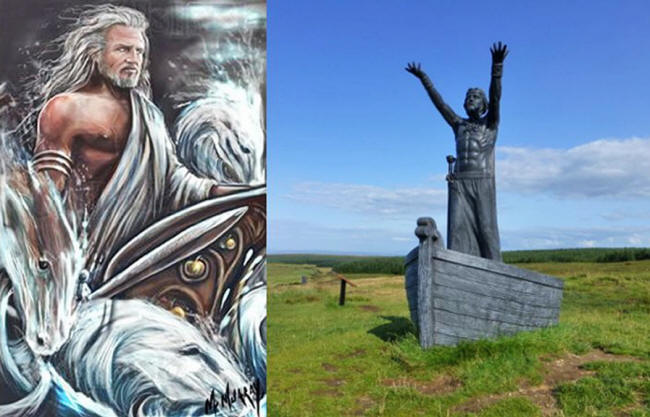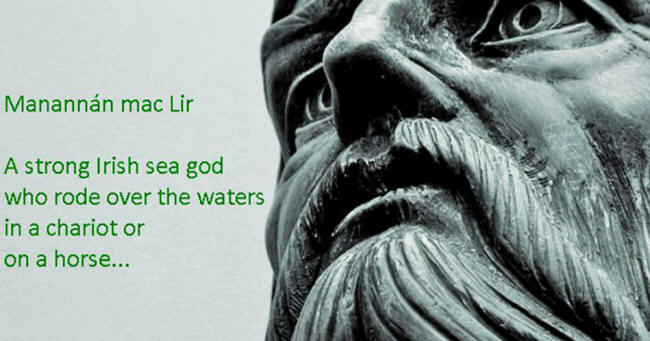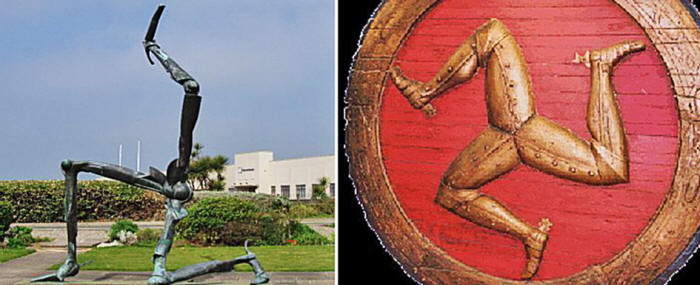|

by A. Sutherland
January 17, 2019
from
AncientPages Website

Left: Artistic impression of
Manannán mac Lir.
Credit:
Usirish.com
Right: Manannán mac Lir
sculpture by John Sutton
at Gortmore, Magilligan,
County Londonderry.
Credit: Kenneth Allen
Wikipedia, CC BY-SA 2.0
Manannán mac Lir (or Manann -
"son of the sea") - is a sea god in Irish mythology and in the Welsh
tradition, he is known as Manawydan.
Generally, Manannán mac
Lir is an important figure in Irish mythology and some Irish
traditions even made attempts to portray him as a historical figure.
Manannán mac Lir was also believed to have been a god of the weather
and healing. His father was Lir, an old and obscure god of the sea
and ocean.
Manannán mac Lir had a beautiful wife Fand (Fiand) who for
some time lived with his consent with a hero, known as
Cuchulainn. Later, when she had
to part with him, the god of the sea used to wear their mantle so
that they would never meet again.

Manannán mac Lir statue in Co Derry.
Image via Irish Times
He raised the god
Lugh (Luga) himself and was a
foster father to other children.
As he never lived on
land, he was believed to dwell somewhere in the ocean on an island
known under different names (one more beautiful than the other) such
as:
-
Tír Tairngiri
(Country of Promise)
-
or Mag Mell
(Plain of Joy)
-
or even and
Emain Abhlach (Island of Apple Tree), which was
identified with the island of Avalon, in later legends.
Curious Being With No Head or Torso But Three Legs
Symbol
of The Isle of Man
The name of this god derives from that of the
Isle of Man (also known as Manx).
In ancient beliefs, the
island was ruled by Manannán mac Lir, who would protect the island
from invaders with his misty cloak.
According to a legend, he was the first ruler of the island named
for him,
"he lived in a castle
on the top of Mount Barrule, where he is buried, although other
stories claim his burial mound can be seen on the seashore
beneath Peel Castle on the Isle of Man".
A vantage point looking
out to sea was called Manannán’s Chair, from which he was said to
keep watch.

The Three-Legged Isle of Man Emblem.
Manx Museum, Douglas.
"Manx fishermen claimed that, as they mended their nets,
Manannán came to them, walking along the seashore followed by a
curious being who seemed to have no head or torso but three legs
- the symbol of the ever moving sea and also the crest of the
Isle of Man…"
(P.
Monagan)
On the Isle of Man, the
history of
the Triskelion (‘three legs’) goes
as far back as pagan times and was originally a symbol of the sun
and of power and life.
Extraordinary
Magical Possessions
Manannán has many extraordinary magical powers.
He owned,
-
a self-propelling
boat named Scuabtuinne ("wave sweeper")
-
a sea-borne
chariot drawn by the horse Enbarr ("water foam")
-
a powerful sword
named Fragarach ("the answerer")
-
a cloak of
invisibility (féth fíada)
The god used a chariot
drawn by horses to move across the waves on the sea, traveling
faster than the wind could blow.
His favorite horse was
named Enbharr. His attribute was a pig and he possessed magical pigs
that could be eaten each day and appear alive next day.
He possessed the ability to change his form to become any creature
he wanted even a particular mortal if needed. He could grant his
supernatural powers to others and create illusions of things to make
them numerous or make them invisible.
Manannán mac
Lir And Tuatha Dé Danann
Manannán mac Lir is believed to be older than
the Tuatha de Danaan.
He remained affiliated
with both the Tuatha Dé Danann and
the Fomorians. However, he did not
originally belong to Tuatha Dé Danann, one of the most central
deities of ancient Ireland.
This lineage is only
given to him by a later tradition.
Tuatha Dé Danann accepted him and he helped them after they were
defeated by
the Milesians and were forced to
hide. Thanks to him, they could retire to
the Otherworld (also called 'Sidhe'
or the 'Hollow Hills') and remain invisible to people.
The invisibility was
brought by magical fog.
Manannán mac Lir gave Tuatha Dé Danann even more, namely,
immortality and
eternal youth.
He also invited them to
an extraordinary feast where magical pigs were served and then,
endlessly renewed after having been eaten.
Manannán Appeared In
Literature And Scottish Folklore
In many Irish and Scottish tales, Manannán is sometimes a merchant
mariner or a brave sailor who possess extraordinary celestial
navigational skills so he is never disoriented or lost at sea.
Oral tradition has
survived until today on the Isle of Man and there are still many
stories about the sea god Manannán mac Lir...
| 



